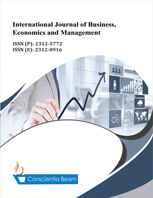Financial Inclusion and Poverty Alleviation: The Contribution of Commercial Banks in West Africa
DOI:
https://doi.org/10.18488/journal.62.2020.71.57.70Abstract
The study delves into financial inclusion and poverty alleviation with emphasis on the contribution of the commercial banks in West Africa from the period of 2004 to 2015. To achieve the objective of the study. In a panel of 10 West African countries, the study aimed at assessing the dynamic relationship that exists between financial inclusion and poverty alleviation. In order to achieve this objective, the study utilized some panel data methodologies such as unit root tests and cointegration tests to unravel the characteristics of the variables whether they statistically fit for further regression. The study employed dynamic panel data methodology to analyze the data to make statistical inference. The study found out that financial inclusion has positive impact on poverty alleviation but taking into consideration the number of commercial banks, it was evidenced that it has negative impact on poverty alleviation whiles number of ATMs and total amount of loans granted are insignificant in poverty alleviation. Government effectiveness as in the quality of policy formulation, implementation and the credibility of the government’s commitment to such policies has positive impact on poverty alleviation but regulatory quality which is the ability of the government to formulate and implement sound policies and regulations for private sector development has negative impact on poverty alleviation. The study recommends that commercial banks should widen their scope of operation to reach out to the poverty-prone areas. Moreover, governments should create the enabling environment and formulate and also implement sound policies which can boost poverty alleviation.

